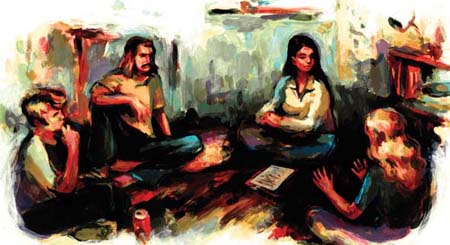 |
 |
| current issue |  | past issues |  | send a letter/news |  | address update |  | advertise |  | about us |  | alumni home |
Features
|
Out Front
When UNH's first gay student group fought for its rights, it paved the way for the rest of the country. |
Easy to print version Make a comment |
Also See:
Out Bid: A skirmish over a pancake breakfast launches a long-running campus tradition
'I could have been one of those people': Wayne April '74
'The biggest lesson was to question authority': Ann Philbin '76
One Tough Lawyer and Proud of It: Cris Arguedas '75
Full-length version
 |
No one had asked, but Wayne April '74 was about to tell. On a spring day in 1973, he sat nervously in the office of The New Hampshire, waiting to make the editor an offer: If you run an honest story about being gay on campus, you can quote me by name.
Until then, gay life at UNH had existed in the shadows, and April was sick of hiding. He wanted to live openly—or did he? As he waited, he began to imagine eyes staring, voices whispering harsh judgments. His hands shook. He wanted to bolt.
But April stayed put, and his actions that day set off a two-year conflict. Before it was over, the members of UNH's Gay Students Organization would be called perverts in the press and mentally ill in court. The governor would repeatedly threaten to cut off all university funding if they didn't disband. As they fought for their rights, they stepped to the front of a movement to change the way all gay citizens in this country are treated and perceived. And in the end, their simple desire to be recognized would create a legal precedent that still holds today.
April had taken a year off from school, and when he returned, he found he'd lost patience with the status quo. "I was really dissatisfied with the state of gay life on campus—or the fact that there wasn't any, and what there was, was kind of clandestine," he says now.
After meeting with New Hampshire editor Ed Penhale '73, April gathered 10 friends at his rented house in Barrington. Four spoke on the record for Penhale's story, "UNH Homosexuals Looking Out the Closet Door." April followed with a column explaining why he was going public. "I am not abnormal, sick or perverted," he wrote, "and henceforth my life is going to be lived in the open, as it should be, with a healthy consciousness and an open state of mind."
Shortly afterward, the Student Organizing Committee recognized the Gay Students Organization as an official student group. Its mission statement listed four goals: to promote recognition of gay people on campus, organize social functions at which straight and gay people could learn from each other, sponsor programs to educate the public, and give gay members of the campus community a way to communicate.
To April today, those goals look "really vanilla." To Meldrim Thomson, then governor of New Hampshire, they looked like a call to revolution. "It is unfortunate that a 'gay club' made up of socially sick students has been organized and officially recognized on the university campus," Thomson wrote to his fellow university system trustees. "The university is not a hospital for the disturbed."
Thomson had already solicited an opinion from Attorney General Warren Rudman, and—when Rudman said UNH had no grounds to object as long as the group followed university rules—decided to ignore him. Other trustees took note, however, and in May 1973, all but one voted to recognize the group. Though the vote carried no authority, it infuriated the governor and his ally, William Loeb, publisher of the Manchester Union Leader. Thomson vowed to replace the offending trustees, and the paper began publishing a steady stream of stories with headlines like "Perverts Will Flock to UNH." An editorial calling the trustees' vote "repugnant, asinine and spineless" and "a disgusting affront to common decency" ran on the front page with a headline many alums can still recite from memory: "Boot Out the Pansies."
Easy to print version
blog comments powered by Disqus

